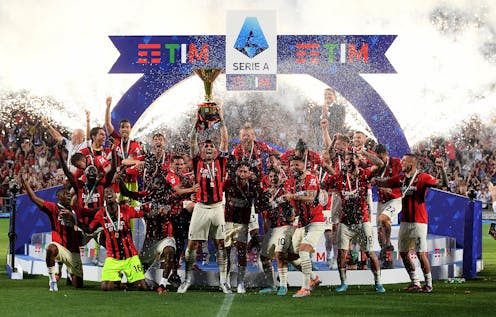
After 11 years of waiting, AC Milan finally lifted the Italian league Serie A trophy on 22 May. It’s the 19th title for the club since its founding more than a century ago.
In recent years, Milan has become known for taking a prudent approach to financial management which prevents it from spending on players to the degree that some of its rivals do. Here, I contend that Milan’s win is good for football and carries some lessons for the management of other organisations.
Organisations tend to reward their best-performing employees and are willing to break wage structures to keep their employees from being poached by other firms.
Sometimes, this comes with a cost, as other employees may feel under-appreciated and think they deserve to be rewarded at the same level. These practices can disrupt harmony in the workplace, and firms need to think about the consequences of breaking their wage structure to ensure such methods will not disrupt team dynamics.
It is commonly accepted in football that clubs need to spend big to win trophies. France’s Paris Saint-Germain (PSG) spent more than €1.4 billion (US$1.48 billion) over 10 years on player transfers to win eight league championships and 12 domestic cups.
Meanwhile, England’s Manchester City spent around €1.7 billion in the same period to win six league championships and eight domestic cups over the past decade.
But at AC Milan prudent financial management has been a key characteristic in its operation ever since they were taken over by the United State-based hedge fund Elliott Management back in 2018.
AC Milan ‘only’ spent €65.3 million strengthening their squad and replacing outgoing players in this title-winning season. This amount is significantly lower than fellow Italian clubs Juventus (€126 million) and AS Roma (€100 million).
Milan’s total wage bill is €81 million, much less than its city rival Inter Milan (€140 million) and Juventus (€160 million). The club sticks by its commitment not to overspend on wage bills. Consequently, the club has lost (and will continue to lose) players on free transfers.
Indeed, Milan would rather lose critical players on free transfers than disrupt the team harmony by breaking the wage structure.
Faith in the youth
The average age of AC Milan’s starting eleven – the main players in the game – for the past three weeks is 24.5. This makes it one of the youngest squads in Italy.
When Milan lost experienced centre backs Simon Kjær and Fikayo Tomori to injury late last year, they decided not to panic-buy any players during the winter transfer window. Instead, they trust their 21-year-old Pierre Kalulu and 22-year-old youth-academy graduate Matteo Gabbia.
In this title-winning season, Milan conceded the least amount of goals this season (tied with Napoli), a further testament to the quality of the young defenders. What makes this team unique is not just the youngest average age of the squad but the mentoring that takes place between senior players and the young players.
Established players such as Olivier Giroud and Zlatan Ibrahimović provide ongoing mentoring for the younger generation of players such as Sandro Tonali, Brahim Diaz and Rafael Leão.
Learning from AC Milan, organisations should consider a balanced approach in recruiting the next generation of leaders while partnering them with experienced colleagues to help maximise their potential. Organisations should develop a system whereby senior colleagues can mentor junior staff to improve the benefits of mentoring for mentors, protégés and organisations.
Superstar vs Superteam: what we learned from AC Milan’s victory
Unlike other teams built around superstars, Milan could not afford to bring superstars to the team and instead has relied on developing from within. Indeed, having no “superstars” helped nurture the team spirit where the team won through strong teamwork rather than individual performances.
In a recent interview, Stefano Pioli, the AC Milan coach, admitted that losing senior players such as Simon Kjær and Zlatan Ibrahimović to injuries helped the team grow.
Organisations are often tempted to rely on superstars to improve organisational performance by recruiting or poaching star employees from other firms. However, sometimes, the key to improving organisational performance is by developing your team from the inside.
In 2020, after failing to reach the league’s top-four, the AC Milan board wanted to replace Stefano Pioli with Ralf Rangnick, an experienced manager with a proven record of trophies. At that time, Pioli had never won any trophies and did not have a strong track record.
However, the board made a surprise u-turn and decided to extend Pioli’s contract.
The decision paid off. Milan secured a return to the European Champions League the following season and has now won the Serie A title.
Good leaders believe in their employees. They are convinced that their team can grow and achieve their objectives if given the opportunities and trust to do so.
Overall, AC Milan winning the Serie A is not just good for sporting reasons. It demonstrates that money can not always buy trophies, and organisational values matter. Prudent financial management, coupled with empowering leadership that develops a team from the inside out, can generate successful outcomes.
Riza Casidy does not work for, consult, own shares in or receive funding from any company or organization that would benefit from this article, and has disclosed no relevant affiliations beyond their academic appointment.
This article was originally published on The Conversation. Read the original article.







